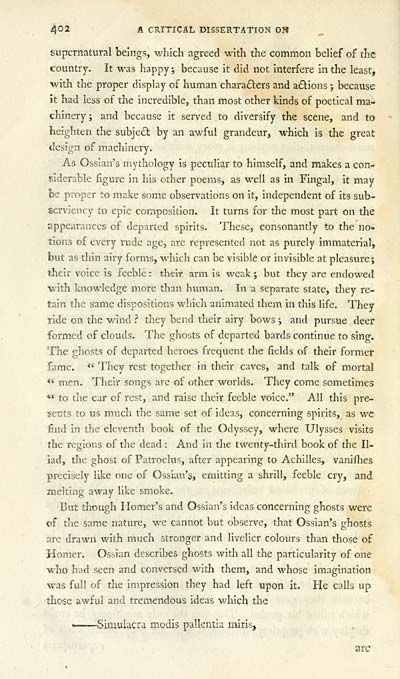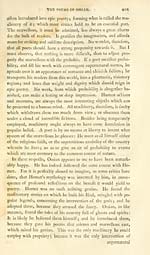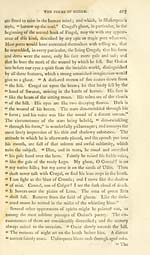Download files
Complete book:
Individual page:
Thumbnail gallery: Grid view | List view

402 A CRmCAL DISSERTATION ON
supernatural beings, which agreed with the common belief of the
country. It was happy ; because it did not interfere in the least,
with the proper display of human charaders and aftions ; because
it had less of the incredible, than most other kinds of poetical ma-
chinery; and because it served to diversify the scene, and to
heighten the subje6t by an awful grandeur, which is the great
design of machinery.
As Ossian's mythology is peculiar to himself, and makes a con-
siderable figure in his other poems, as well as in Fingal, it may
be proper to make some observations on it, independent of its sub-
serviency to epic composition. It turns for the most part on the
appearances of departed spirits. These, consonantly to the no-
tions of every rude age, are represented not as purely immaterial,
but as thin airy forms, which can be visible or invisible at pleasure ;
their voice is feeble : their arm is weak ; but they are endowed
with Icnowledge more than human. In a separate state, they re-
tain the same dispositions which animated them in this life. They
ride on the wind ? they bend their airy bows ; and pursue deer
formed of clouds. The ghosts of departed bards continue to sing.
The ghosts of departed heroes frequent the fields of their former
fame. " They rest together in their caves, and talk of mortal
** men. Their songs are of other worlds. They come sometimes
*' to tlie ear of rest, and raise their feeble voice." All this pre-
sents to us much the same set of ideas, concerning spirits, as we
find in the eleventh book of the Odyssey, where Ulysses visits
the regions of the dead : And In the twenty-third book of the Il-
iad, the ghost of Pati-oclus, after appearing to Achilles, vanifhes
precisely like one of Ossian's, emitting a shrill, feeble cry, and
melting away like smoke.
But though Homer's and Ossian's ideas concerning ghosts were
of the same nature, we cannot but observe, that Ossian's ghosts
are drawn with much stronger and livelier colours than those of
Homer. Ossian describes ghosts with all the particularity of one
who had seen and conversed with them, and whose imagination
was full of the impression they had left upon it. He calls up
those awful and tremendous ideas which the
——Simulacra modis pallentia miris.
supernatural beings, which agreed with the common belief of the
country. It was happy ; because it did not interfere in the least,
with the proper display of human charaders and aftions ; because
it had less of the incredible, than most other kinds of poetical ma-
chinery; and because it served to diversify the scene, and to
heighten the subje6t by an awful grandeur, which is the great
design of machinery.
As Ossian's mythology is peculiar to himself, and makes a con-
siderable figure in his other poems, as well as in Fingal, it may
be proper to make some observations on it, independent of its sub-
serviency to epic composition. It turns for the most part on the
appearances of departed spirits. These, consonantly to the no-
tions of every rude age, are represented not as purely immaterial,
but as thin airy forms, which can be visible or invisible at pleasure ;
their voice is feeble : their arm is weak ; but they are endowed
with Icnowledge more than human. In a separate state, they re-
tain the same dispositions which animated them in this life. They
ride on the wind ? they bend their airy bows ; and pursue deer
formed of clouds. The ghosts of departed bards continue to sing.
The ghosts of departed heroes frequent the fields of their former
fame. " They rest together in their caves, and talk of mortal
** men. Their songs are of other worlds. They come sometimes
*' to tlie ear of rest, and raise their feeble voice." All this pre-
sents to us much the same set of ideas, concerning spirits, as we
find in the eleventh book of the Odyssey, where Ulysses visits
the regions of the dead : And In the twenty-third book of the Il-
iad, the ghost of Pati-oclus, after appearing to Achilles, vanifhes
precisely like one of Ossian's, emitting a shrill, feeble cry, and
melting away like smoke.
But though Homer's and Ossian's ideas concerning ghosts were
of the same nature, we cannot but observe, that Ossian's ghosts
are drawn with much stronger and livelier colours than those of
Homer. Ossian describes ghosts with all the particularity of one
who had seen and conversed with them, and whose imagination
was full of the impression they had left upon it. He calls up
those awful and tremendous ideas which the
——Simulacra modis pallentia miris.
Set display mode to: Large image | Transcription
Images and transcriptions on this page, including medium image downloads, may be used under the Creative Commons Attribution 4.0 International Licence unless otherwise stated. ![]()
| Early Gaelic Book Collections > Ossian Collection > Poems of Ossian, the son of Fingal > (414) |
|---|
| Permanent URL | https://digital.nls.uk/77928311 |
|---|
| Description | Selected books from the Ossian Collection of 327 volumes, originally assembled by J. Norman Methven of Perth. Different editions and translations of James MacPherson's epic poem 'Ossian', some with a map of the 'Kingdom of Connor'. Also secondary material relating to Ossianic poetry and the Ossian controversy. |
|---|
| Description | Selected items from five 'Special and Named Printed Collections'. Includes books in Gaelic and other Celtic languages, works about the Gaels, their languages, literature, culture and history. |
|---|

